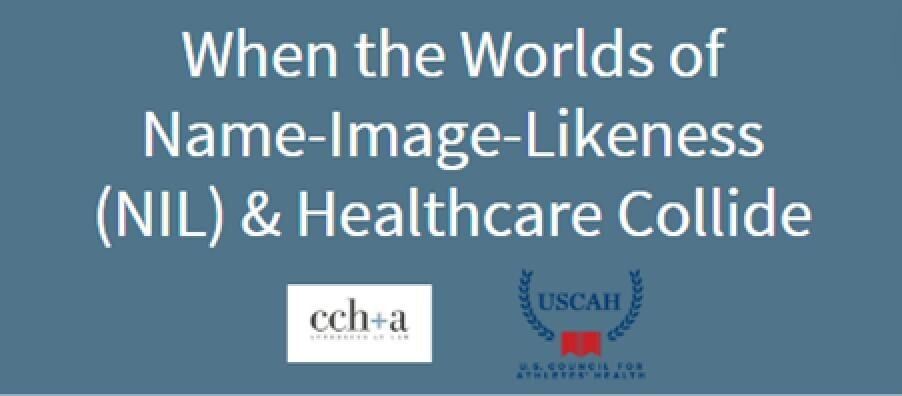When the Worlds of Name-Image-Likeness and Healthcare Collide

Author: Matt Banker
POST DATE: 2.12.24

When the Worlds of Name-Image-Likeness and Healthcare Collide
Authors: Matthew Banker; CCH+A; Dr. James Borchers, M.D., U.S. Council on Athletic Health (USCAH); Connor Glass, CCH+A; and James Nussbaum, CCH+A.
Opening
Since the NCAA adopted its interim Name Image Likeness (NIL) policy in 2021 permitting student-athletes to monetize their NIL, student-athletes across the country are cashing in. Many are referring to this new era of college athletics as the “Wild West” as coaches, boosters, administrators, student-athletes, members of Congress, and other third-parties are scrambling to make sense of the evolving landscape. The transfer portal is seemingly more congested than Grand Central Station on a Monday morning, a federal judge has weighed in on the NCAA’s transfer rule, NIL collectives have arrived on the NIL scene, and the NCAA has adopted another round of NIL policies – this most recent iteration focused on student-athlete protections.
With all this frenetic activity across college sports, one area of the college athletics ecosystem that is seeping into the NIL arena without extensive national media coverage is the world of sports medicine and healthcare. In some respects, NIL is the new patient waiting outside the Athletic Department’s Sports Medicine office door.
Many college and high school athletes are leaning into NIL and earning income not seen by previous generations of athletes. Individuals and companies in healthcare see upside to finding athletes to be their spokespeople or collaborate in service-based partnerships. For example, last year, eight Long Island high school football players signed NIL deals with a local sports medicine provider, Performance Health; two brothers from Northern Kentucky, Michael and AJ Mayer, signed NIL deals as college athletes with Beacon Orthopedics & Sports Medicine, a medical provider the two had been going to since they were kids; the St. Luke’s University Health Network, a hospital network in Pennsylvania, partnered with more than 20 college and high school athletes in NIL deals; and Kingdom Family Dentistry, a dentist office out of Cincinnati, signed NIL deals with student-athletes from rival schools University of Michigan and Ohio State University in its promotional hype video, just to name a few.
When the worlds of NIL and sports medicine intersect, though, there are potential developments that risk managers, university counsel, sports medicine and athletic administrators on university campuses should be tracking.
Student-athletes may find NIL opportunities promoting or endorsing a physician, a hospital system, a clinic, a medical equipment supplier, a nutritional supplement manufacturer, or other individuals, companies, and organizations with some connection to healthcare. From those NIL opportunities, the student-athletes may find themselves seeking care, medical advice, second opinions, and/or free products or services from these individuals, companies, and organizations that operate in healthcare. This is where some of the challenges and potential complexities begin to surface.
In situations where a student-athlete has incurred an injury or illness, the student-athlete may seek medical guidance or treatment from a non-University affiliated medical provider that they may have become acquainted with via an NIL agreement. For example, a student-athlete might promote a physical therapy/rehab clinic on social media and receive free treatments as NIL compensation. This opportunity for the student-athlete may be a challenge for institutions that are not used to athletes engaging outside entities for care.
NIL deals can spring from all corners of commerce including healthcare. When a student-athlete engages in an NIL deal with a healthcare provider, the student-athlete suddenly has immediate access to a medical practitioner that may be outside the university’s preferred medical provider. As a result, university medical practitioners may be limited in their ability to evaluate the standard of care the student-athlete receives from outside service providers, and the student-athlete may be incentivized to prioritize the outside healthcare provider over the university’s provider including in situations where medical opinions as to whether the student-athlete is cleared to participate may differ.
It is important for institutions to clearly define the roles and responsibilities of its sports medicine personnel with respect to clearance for participation at the institution. While the athlete may seek care from and affiliate with any health care provider of their choosing, only institutional personnel are empowered to clear the athlete for participation at the institution. Understanding the requirements and expectations for clearance will become even more important with potential NIL opportunities emerging between athletes and outside healthcare providers.
Concurrently, the educational outreach and notice to student-athletes about these roles, responsibilities, their rights within their medical care management, and the dynamics around clearance to participate protocols are equally important. The athletics department inclusive of sports medicine, sport administrators, and compliance administrators should ensure such educational outreach on student-athlete healthcare policies and procedures is deliberate and consistent across all sport programs.
In an era in which student-athletes’ rights are in focus and the additional involvement of third-parties like trainers and specialists in the life of student-athletes has become normalized, it should come as no surprise that more and more student-athletes are seeking second opinions from outside medical providers as it pertains to their university administered healthcare. The origin of the second opinions may come from a family doctor they have been seeing since high school, a healthcare provider referred to them by a teammate, or a hospital system they have endorsed in a lucrative NIL deal.
With so much on the line for student-athletes within an evolving landscape and the new NIL frontier presenting novel questions for institutions, we outline below a few “NIL-meets-healthcare” hypotheticals, best practices and first steps on what institutions should do in these situations.
Hypotheticals
Student-athlete endorses an outside medical provider as part of an NIL deal. After an injury, the student-athlete insists on getting a second opinion from the outside medical provider.
An institution should have a clearly stated policy addressing whether the institution will take financial responsibility for costs associated with a student-athlete in any sponsored sport seeking a second medical opinion including whether the student-athlete needs pre-approval from the institution. Institutions do not “own” the healthcare of the athlete but could have a policy related to financial responsibility pertaining to second opinions. The policy may require that student-athletes who would like a second opinion must obtain a “physician referral form” from a member of the institution’s medical personnel. The outside physician would then be required to update the form with the second opinion as well as the proper releases to share the student-athlete's protected health information to make determinations of clearance to participate.
Student-athlete endorses an outside medical provider as part of an NIL deal. The outside provider gets involved with the student-athlete’s medical treatment, which does not coincide with the institution’s medical personnel’s treatment plan.
When there is a discrepancy in opinion between the institution's medical personnel and an outside medical provider, there are a couple of options. If the student-athlete received the second opinion without prior acknowledgement from the institution, the institution can inform the student-athlete that the opinions of its medical personnel are final. If the student-athlete followed the institution’s policy and got approval for the second opinion, a third opinion can be
requested. In this case, the institution’s medical personnel can choose a third party (in agreement with the student-athlete) to provide its medical opinion. Once the third party provides feedback, the institution’s medical personnel should consider all opinions. The institution’s decision-making process should proceed including the understanding that the athlete may receive an opinion that differs from the institution’s and decide that they are going to follow the advice of the outside clinician. For example, a student-athlete’s second opinion from an outside practitioner may indicate the athlete should not be cleared to participate when the athlete has been cleared by the institution’s personnel to participate. Conversely, in a situation in which the institution has not medically cleared a student-athlete to participate, the student-athlete may have received a second opinion indicating they should be cleared to participate. In this latter example, it is the student-athlete’s right to transfer to a different institution with the hope that another institution’s medical personnel clear the student-athlete to participate.
Student-athlete endorses a performance training business without disclosing the NIL deal to the university.
While state laws vary as to whether student-athletes are required to disclose NIL deals to their schools, many institutions require some form of NIL disclosure. NCAA Division I recently adopted new legislation to require member institutions to have an NIL policy specific to reporting requirements and concurrently require student-athletes including incoming prospects to report NIL transactions within certain time periods and dollar thresholds per transaction, as specified. This new legislation takes effect August 1, 2024. In addition to compliance with state and NCAA provisions, a reporting requirement helps institutions and student-athletes remain aligned on any regulated aspect of an NIL agreement including use of an institution’s marks and logos or whether the institution or state law has regulated or prohibited specific product or service categories (e.g., sports gambling; tobacco; NCAA banned substances) that student-athletes may engage in for NIL endorsement purposes. In a similar vein, the institution’s athletics department should incorporate a policy that requires student-athletes to disclose the existence of NIL deals that have any connection to healthcare providers, medical equipment and supply companies, nutritional supplements, athletic performance trainers outside of the institution, and the like. It’s up to the institution to determine if and how its NIL policy may require student-athletes to disclose their NIL agreements. Some institutions may want a copy of the agreement while others may want to incorporate a standard form that student-athletes can fill out regarding certain aspects of the deal. If the institution incorporates the latter policy, it can always follow up with student-athletes to provide more information when necessary. Student-athletes will often train with someone outside of his or her institution, especially when he or she is visiting home or on some sort of break. However, institutions should be wary of endorsement deals with trainers and the deliverables that may be included in those contracts. Although consistent reporting from student-athletes may be its own challenge, institutions’ ability to review NIL deals that may include or be reflective of the student-athlete participating in more physical activities could lead to a timely conversation between the student-athlete and the institution’s medical personnel about any limits or clearance considerations.
Student-athlete endorses a supplements’ brand without recognizing the potential risks affiliated with taking and/or endorsing the company and its products.
“Endorsements must reflect the honest opinions, findings, beliefs, or experience of the endorser.” 16 C.F.R. § 255.1. A student-athlete is ultimately responsible for what products they ingest (including from NCAA Banned Substance List perspective---more on that below) and Federal Trade Commission (FTC) consumer protection standards for endorsing a product including via social media. One cannot legally post about their experience with a product without actually using it, so endorsing a potentially dangerous supplements brand is both a legal and medical risk for student-athletes. It is important that the student-athlete is educated about the potential risks affiliated with taking a supplement and, from an FTC standpoint, has used the product or service to give an honest review as part of his or her NIL agreement.
Student-athlete endorses a nutritional supplement that may contain substances banned by the NCAA.
An institution is required to educate its student-athletes about NCAA banned substances and drug-testing policies. Guidance related to drug education is available in the NCAA Drug Testing Program materials. If an institution becomes aware of an NIL arrangement that may include banned substances, it is critical that the institution informs the student-athlete immediately. The institution must follow its own drug-testing policies and make sure the student-athlete is aware of the implications of failed NCAA drug testing, including being declared ineligible from competition. As for student-athletes, they should be consulting with their designated athletic trainer (ATC) regarding the permissibility of any supplements as it pertains to the NCAA banned substance list. Further, student-athletes may want to utilize services (often available as a phone app) that allow athletes and trainers to scan a product’s label and UPC code for ingredients considered a banned substance under NCAA or USOPC banned lists.
Student-athlete endorses CBD products in an NIL deal.
With the recent surge in professional athletes endorsing CBD products and the changes in state law around cannabis, institutions may want to weigh whether they want to restrict such opportunities for their student-athletes. As a practical matter, institutions should start by referring to any state laws regarding CBD and NIL. For example, the Illinois Student-Athlete Endorsement Rights Act prohibits any publicity rights agreement or compensation from a third-party licensee “... for the endorsement or promotion of gambling, sports betting, controlled substances, cannabis...” Next, the institution should consider its own NIL policies and how they relate to the NCAA’s most recent recommendation to remove cannabinoids from the list of substances included in drug testing at NCAA championships. Even with the NCAA’s approach to cannabis policy veering toward complete deregulation, it remains worthwhile to consider any student and university-level risks related to student-athletes endorsing such products in the NIL arena.
Closing Thoughts
Without question, the NIL landscape for college athletes remains vibrant and evolving while occasionally confounding. NIL’s entry into college sports presents institutions with subtle, if not novel, risk scenarios. College athletics notoriously drives in the fast lane – with first-impression scenarios even arising within the healthcare aspect of your student-athletes’ lives on campus, it’s important to pause and review.
These real-world ‘NIL meets healthcare’ examples are intended to raise awareness and increase insight for administrators on campus. The themes and real-
world scenarios may be timely agenda content for your next legal, risk management, or Athletics-centered committee or task force meeting on campus.
Editor’s Note: This article is intended as a present-day outlook on the intersection of NIL and Healthcare including issue-spotting and best practices to consider in navigating the NIL landscape. The article is not intended as legal advice or a replacement to current institutional policies and procedures. Please consult your institution’s general counsel and athletics department compliance to assist with any questions or scenarios related to NIL, NCAA policies, or implementation of best practices.
About CCHA Sports Law: With decades of combined experience in college athletics, the CCHA Sports Law Group brings its industry-leading acumen with a commitment to integrity and advocacy in representing NCAA member institutions, coaches, administrators, and student-athletes on a myriad of issues tied to NCAA compliance, infractions, eligibility, contracts, NIL, strategic advising, and other matters arising from college sports.
About USCAH: The U.S. Council for Athletes’ Health (USCAH) provides independent, third- party athlete health and safety consultation, education, and compliance from a team of experts with nearly 300 years of experience in athletics healthcare and administration.
